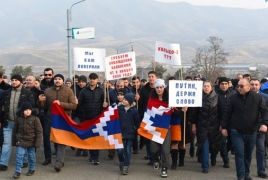
The Lachin corridor, the lifeline road connecting the self-proclaimed republic of Nagorno-Karabakh with Armenia, has been blocked by Azerbaijani protesters since December 12, trapping its 120,000 Armenian residents in an increasingly precarious situation.
In a fresh story, FRANCE 24 says that for the past 40 days, Azerbaijiani protestershave demonstrating against the exploitation of natural resources in Karabakh.
For Yana, a young teacher trapped in Stepanakert, Nagorno-Karabakh’s de facto capital, life has become one ordeal after another.
“We’ve got used to electricity, gas and water cuts over the past two years,” she says in a quavering voice. “But this blockade, and the fear of being close to starvation, has disrupted life like never before,” she says.
For more than a month, some 15,000 tonnes of food and medicine have been blocked from reaching the enclave.
“The internet connection is getting slower and slower and the electricity is partly cut off. We feel completely isolated, like we’re stuck in a desert that everyone’s forgotten about.”
“People are thinking about the dark days of the past, and having nightmares about the future,” says Yana.
Ruben Vardanyan, head of the breakaway region's government, has set up a crisis unit to deal with the situation. Power cuts in the enclave currently last for four hours a day, most schools have closed and businesses have been unable to operate normally since the crisis began. More than 700 have closed and 3,400 people have lost their jobs.
Access to gas supply has become a matter of survival in a region where temperatures can drop to -10 degrees.
But the only gas supply pipeline runs under a district controlled by Azerbaijan. Authorities in Stepanakert accused Baku of cutting the gas supply on December 13. However, the gas supply was restored after three days amid international pressure on Azerbaijan.
The situation came as no surprise to Gegham Stepanyan, the human rights ombudsman of Nagorno-Karabakh, also known as the Republic of Artsakh.
“It was obvious that Azerbaijan was going to use this tactic (gas supply) to intimidate people, particularly in winter,” explains Stepanyan.
“And there’s no reason why they wouldn’t continue to use this tactic, given the critical state of our infrastructure,” he says.
Nina, 22, is also trapped in Stepanakert. She said Azerbaijan was using the blockade to put the people of Nagorno-Karabakh in a state of “psychological terror”.
“It’s inhuman,” she says. “They’re trying to provoke us – to pressure our treacherous leaders into giving them more land in exchange for opening the road. But we are hanging in there.
Most of our parents lived here during the first war [from 1998 to 1994] when the situation was much worse. We would just like to have some vegetables. At the moment we only eat pasta and grain-based products,” she says.
Only the International Red Cross (ICRC) has been able to access the enclave.
The crisis has drawn international attention with Amnesty International and Human Rights Watch calling for freedom of movement in the Lachin corridor.
The UN High Commissioner for Human Rights issued a similar plea while The Lemkin Institute for Genocide Prevention regularly warns of the threat of ethnic cleansing in Nagorno-Karabakh.
The European Parliament passed a resolution on January 19, condemning the road blockage and calling on Azerbaijan “to reopen it immediately”.
Since December 12, the sole road connecting Nagorno Karabakh to Armenia - the Lachin Corridor - has been blocked by self-described Azerbaijani environmentalists. Karabakh residents have reported food and fuel shortages, while hospital patients don't have access to essential medicines, with only a handful allowed transfer to facilities in Armenia proper.

